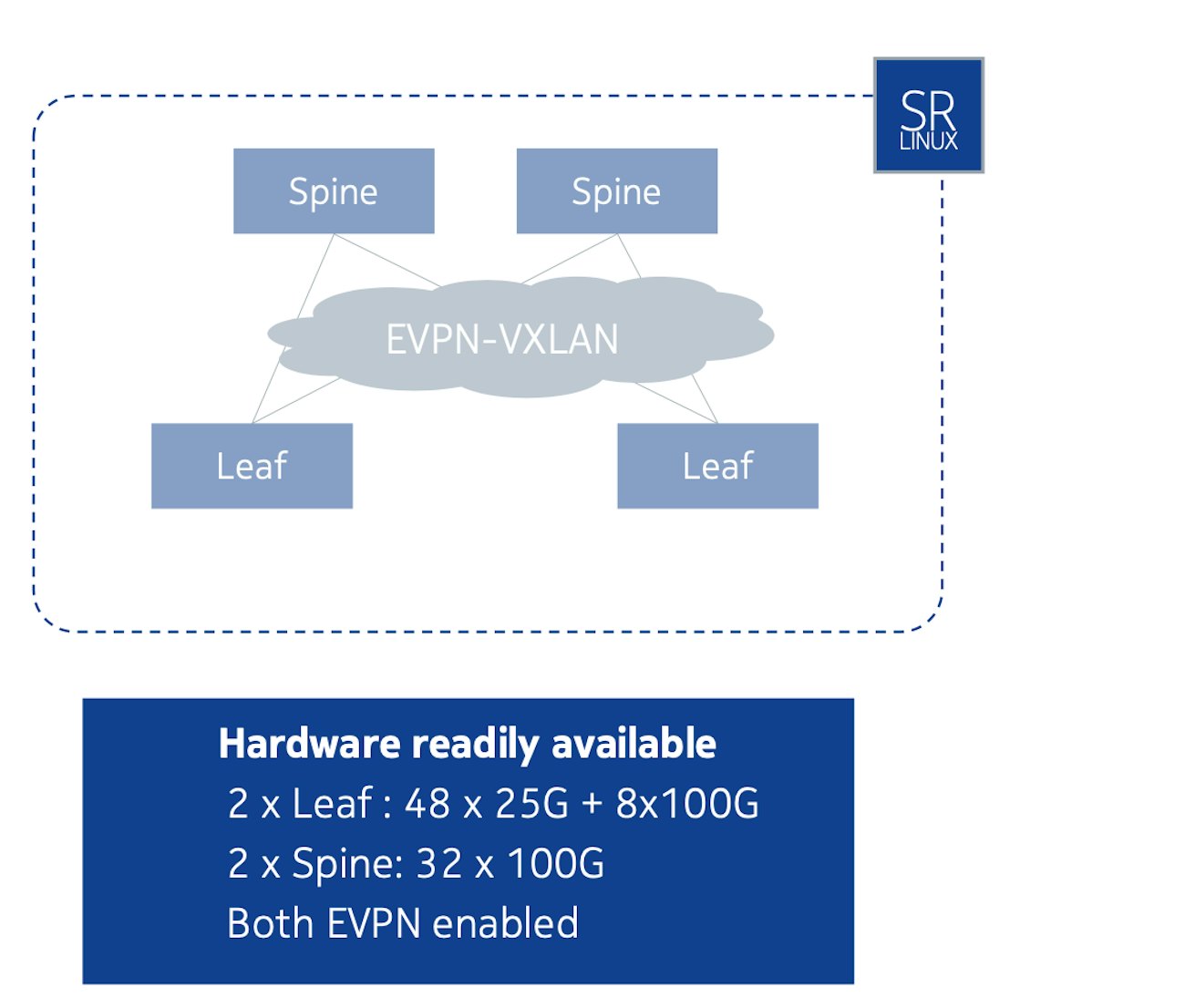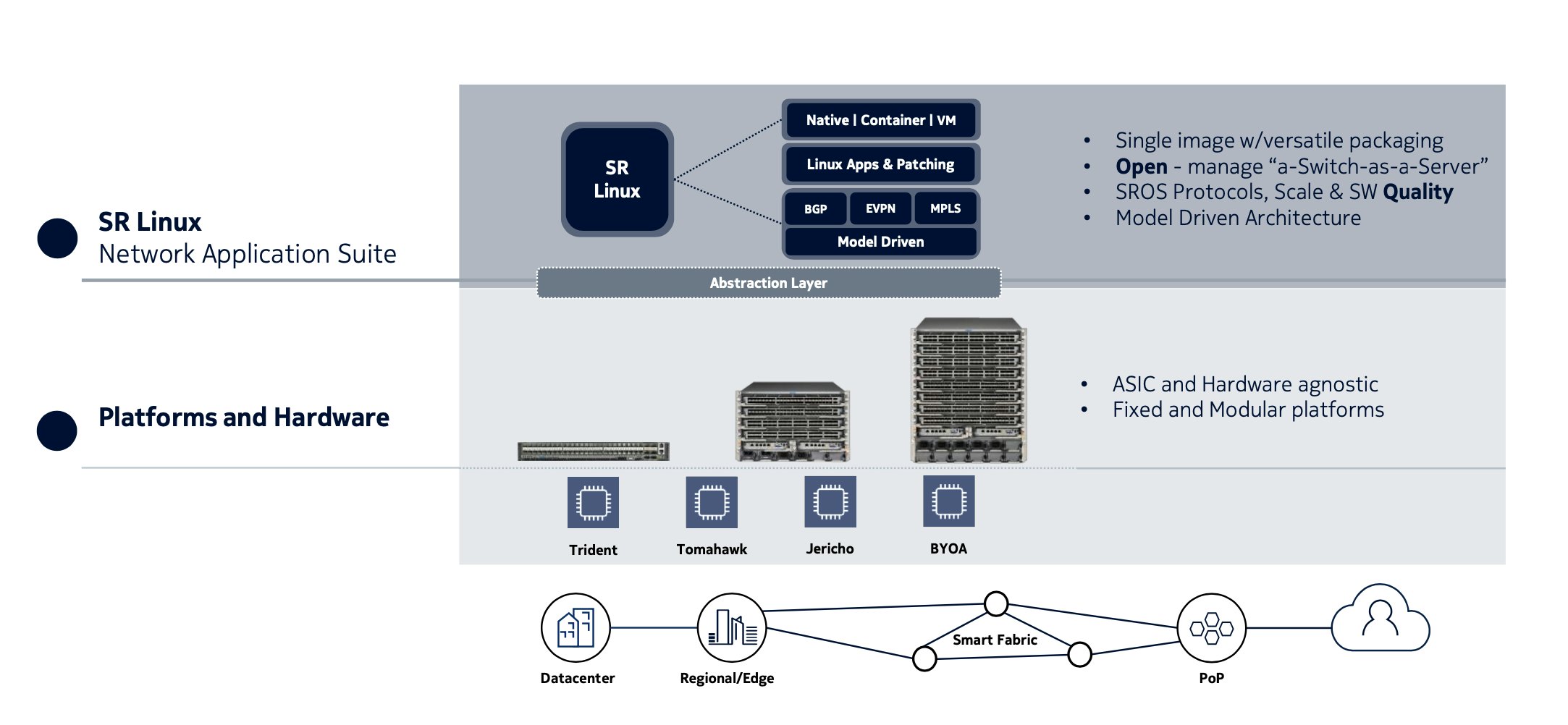We are currently facing very long delivery times due to a worldwide shortage of chips. Delivery times of 9 to 12 months are the rule rather than the exception. We are aware that this has major implications for many of our customers.
Together with our partner Nokia, we have found an attractive solution to this problem. We can make you a unique offer for an IP Fabric starter pack. We can offer this spine leaf data center solution at a very attractive price and is directly available! This is unique in the current market. Below we list the most important advantages for you.
- Quickly available: short lead time
- Attractively prices: unique package deal
- Proven technology: stable and reliable
- Open platform: based on Linux
- Easy integration: open architecture that integrates with an existing IP Fabric
Would you like more information? Download the infosheets or contact our sales department directly.
Nokia Fabric Services System
The Nokia Fabric Services System is a declarative, intent-based automation and operations toolkit that delivers agile and scalable network operations for data centre and cloud environments. Below we give you five benefits of their system.
1. Ground-up, model-driven architecture delivers extensibility
In cloud-scale data centre networks, the primary challenges are scalability and/or ease of operations. SR Linux is designed, from the ground up, with a management architecture that meets the demands of a model-driven world where visibility—and the scalability and granularity of that visibility—are paramount.
SR Linux features a completely model-driven architecture for flexible and simplified management and operations. It delivers an extensible and open infrastructure that allows applications to define and declare their own schemas, enabling the retrieval of fine-grained system states and settings of configuration.
2. Modular, state-sharing architecture
SR Linux uses an unmodified Linux kernel as the foundation on which applications share state via a publish/subscribe (pub/sub) architecture. The Nokia pub-/sub-architecture is implemented using generalised Remote Procedure Call (gRPC), protocol buffers (protobufs) and the Nokia Impart Database (IDB).
The Nokia IDB is a lightweight database that is optimised to handle high volumes of messages while protecting against any one application slowing down the whole system.
3. Field-proven protocol stacks
SR Linux leverages field-proven protocol stacks from the Nokia Service Router Operating System (SR OS), which has a strong pedigree in IP routing.
Webscale, service providers and enterprise data centres are increasingly adopting leaf-spine fabric designs using enhanced IP routing with Multiprotocol-Border Gateway Protocol (MP-BGP), EVPN and Virtual Extensible LAN (VXLAN) protocols. By using field-proven protocol stacks, data centre operators can immediately benefit from the stability, scalability and interoperability of a resilient NOS.
4. Superior CLI programmability and integration of third-party applications
Operators can leverage command-line interface (CLI) plugins to completely customise the way the CLI operates, plugging in Linux commands or pulling the state/configuration from various locations, combining them with system state/configuration to allow advanced logic.
SR Linux allows third-party applications to be fully integrated into the system and given all the same benefits as Nokia applications. This includes consistent configuration via YANG, telemetry support, life cycle management and visibility of system resources.
SR Linux offers a state-of-the-art NetOps Development Kit (NDK) for data centre teams to develop new applications and operational tools in the language of their choice with deep programmatic access to, and control of, the entire system.
5. Scalable automation for all phases of data centre fabric operations
The Fabric Services System implements intent-based approaches to simplify all phases of data centre fabric operations, including Day 0 design, Day 1 deployment and Day 2+ configuration, operation, measurement and analysis.
The system uses the Kubernetes framework and benefits from an established open platform instead of reinventing key platform components. All fabric services use a distributed microservices approach, allowing Nokia to deliver a true cloud-native platform for automation and operations.
Nokia SR Linux overview
Nokia SR Linux was developed in close collaboration with some of the world’s largest data centre operators. It was designed to solve real-world challenges in on-premises and cloud environments where the primary challenges are scalability, ease of operations, or both.
A common approach to this problem is to simplify the data centre network design, components and protocols. While this allows additional scalability, it reduces flexibility in a world of constantly evolving network requirements.
The overall network must still provide high levels of programmability, openness, reliability and extensibility to meet growing DevOps and agility requirements. These diverging requirements cannot be met by current industry solutions, and they were the genesis for the development of SR Linux and the Nokia Data Center Fabric solution (see Figure 1). The Nokia Data Center Fabric solution provides openness, flexibility, robustness and automation to make data centre and cloud environments easier to scale, adapt and operate.

SR Linux delivers:
- An open, extensible and resilient NOS that is fully programmable and massively scalable
- A unique, model-driven architecture designed from the ground up for simplified operations and integrations, and ultimate visibility
- Field-hardened protocol stacks for enhanced IP routing features including, MP-BGP, EVPN and VXLAN
- Extensive streaming telemetry, designed from the core out to support unprecedented granularity and volume
- Unrivalled support for integrating community and customer-driven applications into the core of the system
- Plug-and-play hardware integration
- A customisable, open-source command-line interface (CLI) and on-demand, customised CLIs leveraging the flexibility of Python.
Nokia updates


Press release
Nomios and Nokia triple capacity for GÉANT European research network with renewal of IP backbone
A 10-year frame agreement pegs Nokia as the sole IP critical-network provider for massive backbone network migration for GÉANT led by partner Nomios.


Optical networking Nokia
10 key benefits of passive optical LAN for enterprise connectivity
Passive optical LAN has a lot of benefits for enterprise connectivity, speed and cost optimisation. Read the 10 benefits of passive optical LAN for enterprise connectivity.

Cemil Canturk de Nokia


Optical networking Nokia
Powering considerations of the ONTs in a passive optical LAN
Discover the powering options for passive optical LAN ONTs: local AC powering, local powering with battery backup and remote powering

Cemil Canturk de Nokia





